
Caregiving: Choosing with Care
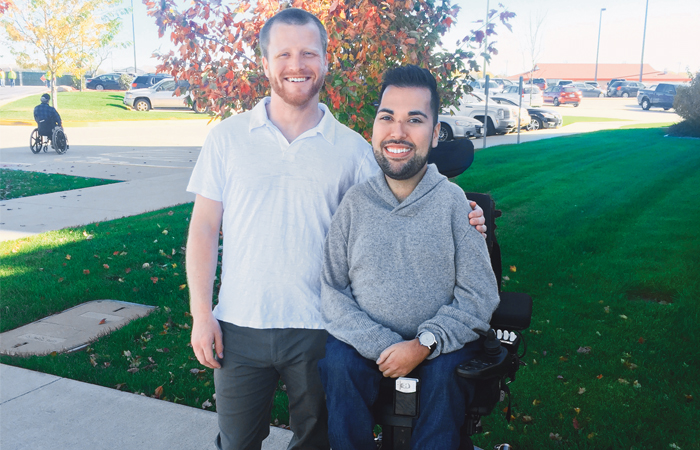
Deciding whether family members or professionals serve as primary caregivers comes down to a nuanced calculation of means, availability and personal preference
Amid the wave of anxiety and emotion that can accompany living with a neuromuscular disease, Bill and Sharon Sumner saw a few things clearly the day they learned of Sharon’s ALS diagnosis. “I knew we would keep her at home, and I knew I would be the one to take care of her,” Bill says.
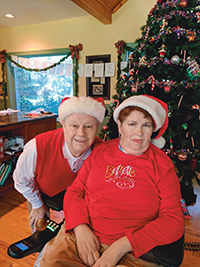
The Sumners were in a prime position to make such choices. Having sold his successful manufacturing business, Bill had the time to devote to his wife and the money to hire personal care attendants (PCAs) as her condition progressed. But for many families, when a diagnosis is made or a disease progresses to the point where daily care is needed, the decision isn’t as clear-cut. Financial means, work schedules, family dynamics and the extent of a support system are among the many factors that go into planning in-home care.
Exploring your options
When a family learns of their care needs, the first thing they should do is assess their financial situation. “Once we get through that difficult moment after diagnosis, financials are the first things we discuss,” says Rebecca Axline, a supervisory licensed clinical social worker who works with families at the MDA ALS Care Center at Houston Methodist Neurological Institute. “Income and assets definitely narrow the focus.”
Families whose income falls below a certain level qualify for complete coverage of in-home care professionals through Medicaid. Families whose income is well above that level typically can afford caregivers out-of-pocket. It’s the households in between that may find themselves in a quagmire.
“Say you have a family where both parents work, and they discover that their child is going to need around-the-clock care,” says Michileen Oberst, an advanced licensed clinical social worker at the MDA Care Center at Stanford University in Palo Alto, Calif. “Each year, those parents have to evaluate how much it would cost to hire a full-time caregiver, versus how much income they would forfeit if one of them leaves the workplace to care for the child, versus the chance that a one-paycheck income would give them access to federal or state benefits.”
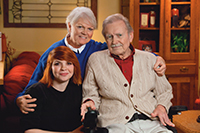
Options are further impacted by where the family lives. Some states, such as Tennessee and California, subsidize the cost of any in-home caregiver (related or otherwise) who meets certain criteria. “Essentially I get to choose, hire and manage my own caregivers,” says Gary Sullivan, a retired attorney with limb-girdle muscular dystrophy (LGMD) in Franklin, Tenn. His wife, Nancy, started out as his primary caregiver, but as his disease progressed, he transitioned to a team of professional caregivers, with Nancy taking over three nights a week. “It puts the power in the hands of the person with a disability, which in my opinion raises the quality of care tremendously,” he says.
For help in navigating all the financial intricacies, MDA Care Centers have multidisciplinary care teams that include social workers who can help families navigate specific issues and find the right type of support, which may include Medicaid/insurance options. Social workers often can connect families with other helpful professionals and organizations if necessary. “The conversation is anchored in, ‘If you do have to pay dollars privately, let’s maximize them as much as possible,’” Axline says.
Choosing a caregiver
Once financial parameters are established, the focus shifts to selecting the caregiver. In those early, anxious days after diagnosis, it’s a natural reaction to want a family member. “I find parents in particular really want to be the ones to care for their child,” Axline says. “A lot of spouses want to care for each other, too.”
Family members can make outstanding caregivers, often joining support groups and attending courses to learn all the skills required to accommodate their loved ones’ physical, medication and equipment needs. Bill Sumner regularly attends his hospital’s CPR and first-aid courses, in addition to getting one-on-one tutorials from Sharon’s equipment provider. “They come to the house and show us how to work the ventilator, suction machine, trachea tubes, all of it,” he says.
“We’ve had people who, by the time all is said and done, we swear they could work as professional nurses,” Axline says.
Aside from the caregiver subsidies available in certain states, family caregivers generally aren’t paid. On the surface, that can translate to big savings. Of course, if the relative is giving up a paid job with benefits, that must be weighed in the financial equation.
The family member should enter their role with the understanding that caregiving is not a typical 40-hour-per-week job. It comes with around-the-clock responsibilities, and while family caregivers often feel that caring for their loved one is rewarding, it is also taxing.
“If you’re a caregiver working for me, you’re not coming over to have coffee with grandpa,” says Sullivan. “You’re working.”
Baths, transfers, meals and midnight repositioning are among the duties that may be required. And as the individual’s disease progresses, so does the work. “When you switch from basic caregiving to a ventilator, you triple the level of care needed,” says Nancy Corrigan Briggs, who facilitates an MDA ALS caregiver support group in Philadelphia and has cared for several family members with ALS. Even the most devoted parent, spouse or sibling may become ill or need an occasional break from daily responsibilities.
Hiring professional caregivers
In her role as a social worker, Oberst, helps families understand that, at some point, they will likely need to look outside the home for caregiver assistance. “The approach has to evolve,” she says. “Family members, of course, make extremely devoted caregivers, and it makes sense for a parent to be the primary caregiver when a child is young. As that child enters young adulthood, though, you may encounter the polarized circumstance of their physically needing more care while intellectually being mature and independent enough to manage their own care.”
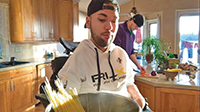
Joe Akmakjian, 26, who lives with spinal muscular atrophy (SMA), turned to outside caregivers in his middle school years, when he saw the relationship with his mother, who was his caregiver, becoming strained. “It got to a point where every day we were fighting about the smallest things,” he says. “Now, my mom is just my mom, and the people who provide my care are here because they’re getting paid. I prefer it that way.”
Axline sees this scenario play out in many families. “There is a real potential for deterioration of the natural familial dynamic,” she says. “The roles change. Time and time again I get family members coming back saying, ‘I just want to be a mom (or a husband or a wife or a sister) again.’”
Axline encourages engaging caregivers from outside the family as early as possible. “The longer they wait, the harder it is going to be to bring in someone new,” she says.
Sullivan waited nearly 10 years to hire his first PCA. By that point, he and his wife had a well-established routine, and it was difficult to adjust. “I think part of it was Nancy not wanting to hand it over,” he says. “She had a hard time letting go.”
Mark Eisenberg, 24, hired his first PCA in college. His mom, Theresa Armstrong, had been his primary caregiver since he was diagnosed with Duchenne muscular dystrophy (DMD) at age 4. Through the years, mother and son established an almost non-verbal rhythm.
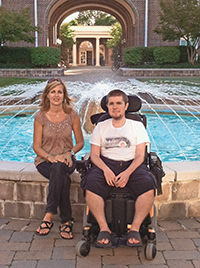
“For so long, you let your doctors or family direct your care, and when the time comes to tell a stranger what you need, you find yourself asking, ‘Wait — what do I need?’”
In his dorm room 30 miles from home, Eisenberg struggled through several unsuccessful hires before finding a reliable, capable PCA. “His second year he texted me at 1 a.m. saying his aide never showed up,” Armstrong says. “I had to drive up at 2 a.m.”
Eisenberg, who now lives at home with Armstrong and works as a blogger, pulls on all his experience — good and bad — to design a custom-fit schedule of sharing care between his mom and paid PCAs.
“The whole experience actually makes you more attune to your own care needs,” Eisenberg says.
The best of both worlds
“I am constantly trying to balance the well-being of the family unit with the age, stage and physical needs of the individual,” Oberst says. All things considered, she believes a combination of family and paid caregivers works well for most families. “But in the end, only a family can determine what’s best for them.”
Speaking as he packed his bag for a brief trip, Bill Sumner’s reflections were much the same. “My heroes are the families who take on the whole of care themselves, but I wish it didn’t have to be that way,” he says. “Here I am about to take a much-needed respite, which wouldn’t be possible without the group of reliable caregivers I have supporting us.”
Shaila Wunderlich is a freelance writer in St. Louis who has been a journalist for nearly 20 years.
Online Exclusive: The Unconventional Interview and How to Find a Compatible, Teachable Caregiver
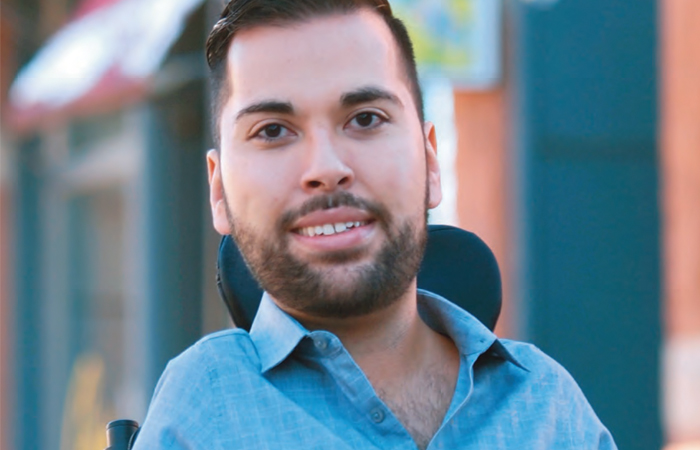
Joe Akmakjian has been involved in hiring his personal care attendants (PCAs) for more than a decade. The 26-year-old, who lives with spinal muscular atrophy (SMA), admits that his interviewing approach isn’t conventional, but it’s served him well since he was in middle school.
“I’m looking for compatibility beyond their ability to complete a task,” Akmakjian says. “I can teach someone how to give me a shower or how to put me to bed, but I can’t teach personality.”
Akmakjian interviews dozens of applicants about twice a year in order to maintain his staff of four to seven PCAs. Once he walks through a short series of “deal-breaker” questions (“Do you live near me? Do you have a driver’s license? Are you comfortable driving?”), he gets down to the nitty gritty of determining if they’re a personality match. Here are a few of his favorite questions.
QUESTION: What’s your sense of humor?
LOOKING FOR: Humor is a must in this job, and mine tends toward the sarcastic. If they have a hard time articulating their sense of humor, I might ask them to name their favorite funny movie or comedian.
QUESTION: What are your biggest pet peeves?
LOOKING FOR: Making sure they aren’t things I do regularly.
QUESTION: What really stresses you out, and how do you deal with it?
LOOKING FOR: Stress is inevitable in everyone’s life; doubly so in this one. How you cope with it is what matters.
QUESTION: How long does it take you to get ready to go out?
LOOKING FOR: Less than 10 minutes. I’m often having to get dressed and prepared for events, and by the time they help me do everything I need to do, they may only have 10 to 15 minutes to primp themselves.
QUESTION: Why did you apply for this job?
LOOKING FOR: I prefer people who have aspirations beyond this job. I don’t want to hear “I want to help people,” or “You are very inspirational.” I’d rather hear, “I need this job to make money so I can pursue my goals.”
What is a Personal Care Attendant?
For individuals with neuromuscular conditions, finding, managing and paying for personal care attendants (PCAs) can be one of the greatest challenges to living on your own. A PCA can be anyone from a registered nurse to a neighbor who helps with daily care tasks.
Who you hire as a PCA and their level of training will depend on your personal and medical needs. For example, a young adult living independently might hire a student to help with bathing and dressing, as well as household tasks like cooking and cleaning. Others might need a PCA with a nursing degree who can administer medication or perform more complex procedures, such as changing G-tubes. PCA schedules can range from a few hours a week to 24-hour live-in care.
For tips and tools to help you find and manage PCAs and additional resources, visit mda.org/young-adults/independent-living.
Support for Family Caregivers
Family caregivers need support — whether it’s in the form of a sympathetic ear, practical advice or getting a break. Here are some ways to find the support you need.
Extend your support network. A care community is a group of people involved in one individual’s care. Lotsahelpinghands.com is a free online service that allows you to set up and manage a community of family members, friends and neighbors. You can keep everyone in the loop on your loved one’s needs and post requests for support. Members of your community sign up for tasks knowing they’re providing exactly the help you need.
Get educated. Learning about your loved one’s disorder and how to care for them can make you a more confident caregiver and help alleviate stress. Work with your local MDA family care specialist and the local MDA Care Center team to learn more about your loved one’s medical condition. Many hospitals offer CPR and first-aid training courses. Medical equipment manufacturers and suppliers often are willing to help you learn to use their products. Bill Sumner, whose wife has ALS, has arranged one-on-one ventilator, suction machine and trachea tube training through his wife’s equipment provider. “They’ve been tremendous,” Sumner says. “They’ll spend hours with us until we get it right.”
Find an MDA support group. Support groups allow families to share their experiences with and receive guidance from others who face similar challenges. Nancy Corrigan Briggs runs a monthly ALS Caregiver Support Group in Collegeville, Pa., attended by MDA families. “We let the group guide us,” she says. “Some days we discuss how to handle the mountains of paperwork, some days we discuss how to afford equipment rental and some days we just allow people to vent their emotions.” Contact your local MDA office to find support groups in your community. Learn more at mda.org/services/support-groups.
Caregiver Resources
MDA is here to provide help, support and hope to families whenever, wherever they need us. To find caregiver resources, visit mda.org/services/caregiver-resources.
MDA Resource Center: We’re Here For You
Our trained specialists are here to provide one-on-one support for every part of your journey. Send a message below or call us at 1-833-ASK-MDA1 (1-833-275-6321). If you live outside the U.S., we may be able to connect you to muscular dystrophy groups in your area, but MDA programs are only available in the U.S.
Request Information